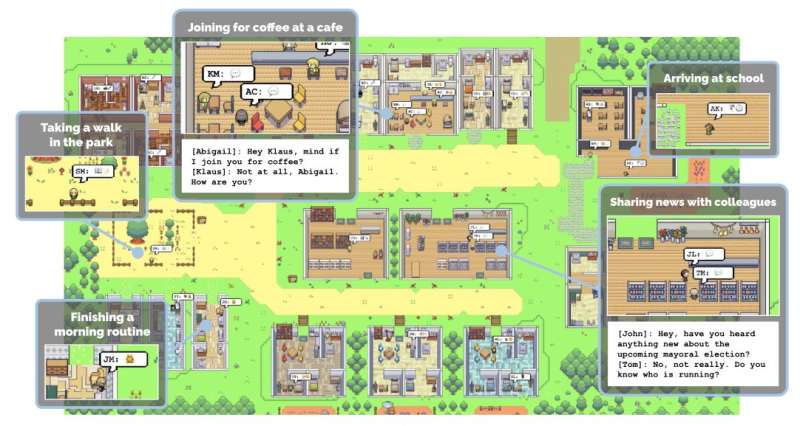
Computer scientists create 'believable' human interactions in AI world of Smallville

A pretty impressive representation of a functioning society with compelling, believable human interactions.
That's the conclusion of six computer scientists from Stanford University and Google Research who designed a Sims-like environment to observe the daily routines of inhabitants of an AI-generated virtual town.
The residents make breakfast, brush their teeth, go to work, plan parties, study music, examine the socioeconomic impact of urban planning, and run for political office.
The researchers say they wanted to craft believable simulations of a typical day's behavior among denizens of the AI town of Smallville. The residents are endowed with the ability to retrieve information from their accumulated experiences, assess those memories and create original routines and future courses of action.
"We introduce generative agents—computational software agents that simulate believable human behavior," the researchers report in a preprint academic paper released last week. "Generative agents wake up, cook breakfast and head to work; artists paint, while authors write; they form opinions, notice each other, and initiate conversations; they remember and reflect on days past as they plan the next day."
Users interact with the agents either as an existing or new character. They can initiate contact through actions or through natural language conversation.
The researchers documented how mention of a Valentine's Day party led to agents spreading word of the party, inviting friends and handling tasks such as decoration design. One agent invited a "secret crush" to the party. Others determined they could not attend because of scheduling conflicts.
An exchange between two agents reveals evidence of familiarity with details of local events and with other characters:
Isabella: I'm still weighing my options, but I've been discussing the election with Sam Moore. What are your thoughts on him?
Tom: To be honest, I don't like Sam Moore. I think he's out of touch with the community and doesn't have our best interests at heart.
In another instance, Isabella turned off her stove when a user told her a dish she was making was burning.
"Success," the researchers said, "requires an approach that can retrieve relevant events and interactions over a long period, reflect on those memories to generalize and draw higher-level inferences, and apply that reasoning to create plans and reactions that both make sense in the moment and in the longer-term arc of the agent's behavior."
Computer-controlled characters are nothing new, of course, but ChatGPT introduces a level of complexity of language perception and character development never realized before.
Future applications could extend beyond games and into the realm of such areas as politics, consumer behavior and psychology.
"Going forward, we suggest that generative agents can play roles in many interactive applications ranging from design tools to social computing systems to immersive environments," the researchers concluded.
The report, titled "Generative Agents: Simulacra of Human Behavior," published on the arXiv pre-print server, is another step forward in the pursuit of ever-more realistic simulations of social environments.
Futurist Ray Kurzweil, author of "The Age of Intelligent Machines," once predicted AI will reach "human levels" by around 2029.
In Smallville, they're almost there.
Conclusion
We hope this blog has helped you to get all information about how computer scientists create 'believable' human interactions in AI world of Smallville .
If you want to build a website in new technology then contact us - https://www.getcodework.com/contact. or through social handle -
Instagram -@getcodework
Linkedin - Codework